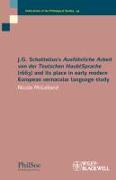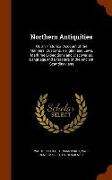- Start
- J.G. Schottelius's Ausführliche Arbeit von der Teutschen HaubtSprache (1663) and its Place in Early Modern European Vernacular Language Study
J.G. Schottelius's Ausführliche Arbeit von der Teutschen HaubtSprache (1663) and its Place in Early Modern European Vernacular Language Study
Angebote / Angebote:
J.G. Schottelius's landmark two-volume theoretical study of German, The Ausführliche Arbeit von der Teutschen HaubtSprache, was the seminal German language text of the 17th century. At 1, 500 quarto pages, his work was more than ten times the length of contemporaneous grammars published in England and France (Wallis's Grammatica Anglicana, 1653, and the pioneering Port-Royal Grammar of 1660).
Germanist and linguist Nicola McLelland presents an accessible yet scholarly exploration that makes sense of Schottelius's lengthy and often unwieldy study by interpreting its disparate elements from grammar to riddles, from verse to dialogue against European discourse traditions that shaped the German linguist's views of language.Demonstrating Schottelius's clear influence on Danish, Dutch, Swedish and Russian grammarians, McLelland reveals how his scholarly significance stretches beyond the borders of Germany to the European continent. McLelland also tackles what many consider the most difficult aspect of Schottelius's legacy within Germany: could even such an influential grammarian as Schottelius have any discernible impact on actual language use?
Finally, McLelland's comprehensive documentation of Schottelius's voluminous source materials and citations provides an invaluable snapshot of the range and limits of scholarly knowledge in seventeenth-century Germany. This monograph offers an important reassessment of Schottelius, along with rich insights into the history of linguistic ideas in Europe.
Lieferbar in ca. 10-20 Arbeitstagen




